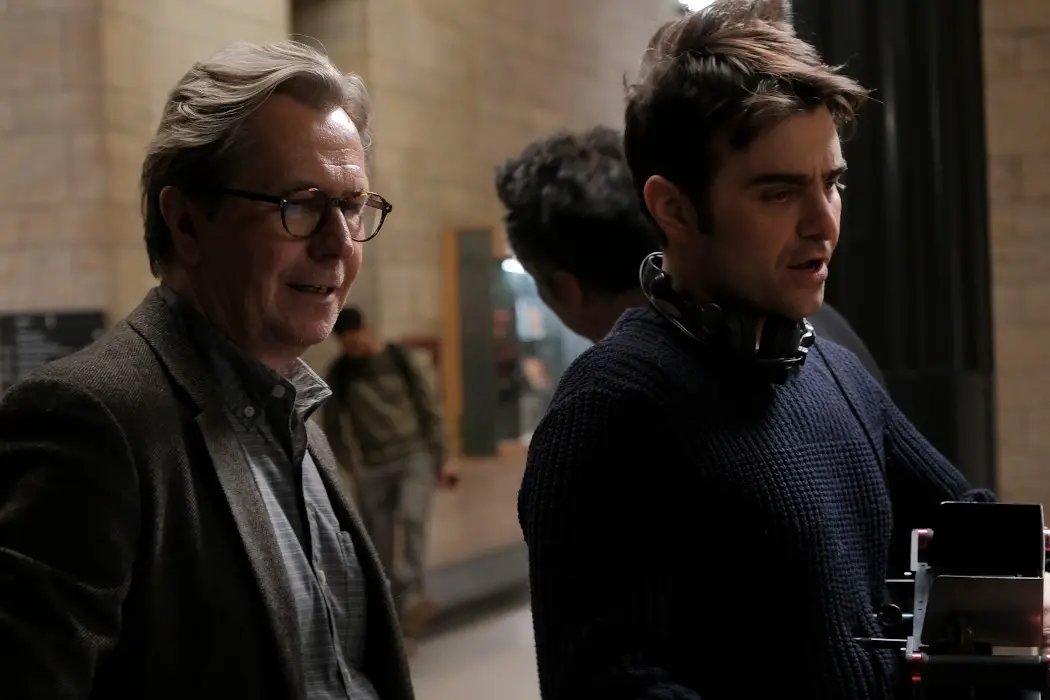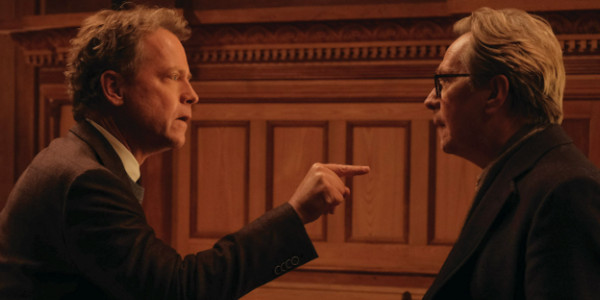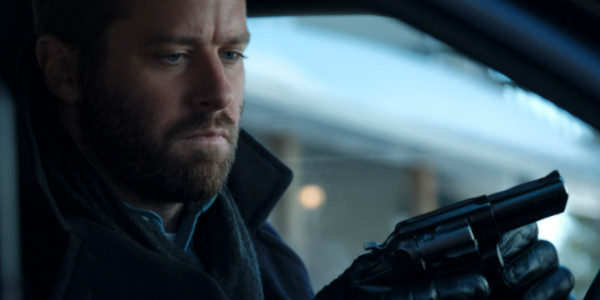Interview with Nicholas Jarecki, Writer-Director of CRISIS

Luke Parker is an award-winning film critic and columnist based…
Nicholas Jarecki‘s Crisis has hit a lot of roadblocks. The film – a three-pronged story centering around the opioid epidemic and featuring an all-star cast including the likes of Gary Oldman, Evangeline Lilly, Michelle Rodriquez, Greg Kinnear, and Luke Evans – had the collective talent and content to catch the eyes of a mass audience. But a pandemic and a slew of controversies surrounding lead actor Armie Hammer has left the film largely untouched.
Jarecki, who hasn’t made a film since 2012’s Arbitrage, has thus taken it upon himself to market his movie, something he calls a “grassroots approach.” To the film’s credit, even without a massive press campaign, Crisis has performed phenomenally since its streaming release, topping the iTunes charts for several weeks – a happy coincidence since, according to the director, iTunes gives the filmmakers a better financial cut than other online services.
Film Inquiry spoke with Jarecki about many different aspects of Crisis, including its shocking revelations concerning opioid abuse, his passionate collaboration with Gary Olldman, and the media reception of the film, or the lack thereof.
This interview has been edited for clarity.
Luke Parker for Film Inquiry: From what I understand, this idea was first inspired by the death of a friend from opiates. How did the emotion from that experience play a role in your writing the script?
Nicholas Jarecki: It was a terrible experience, really. I had this friend, a bright, young guy just a couple years older than me, and he got into playing with pain pills for fun – or whatever, who knows? And as I found out through my research later, often they can be so addictive to some people that they got to have them, and they’ll doctor shop before ultimately switching to heroin because it’s so much cheaper and easier to get.
That’s what happened to him, and then he passed on.
This was 15 years ago. We didn’t understand anything at the time. So right before I made this film, I was reading a lot of the research that was coming out. There was wonderful investigative reporting by the Los Angeles Times, and I called these reporters because they found out that these problems really, in many ways, came from a lab and that opioid manufacturers perhaps had ignored research or downplayed research that showed the pain pills were a lot more addictive than they’d thought – with as much as 20-50% of people who used them.

I thought that there was finally a connective link to make sense of what happened to my friend. There was a way to avoid demonizing the addict: blame the people who took something from a lab that was no good.
That was one of the things we wanted to help advance with the film, the corporate profit motive that’s perhaps driving this explosion of opioid addiction because otherwise, where does it come from? We gave out morphine on the Civil War battlefields. People have been using pain medication for 150 years, but only in the last 10 or 15 years have we seen a million or more people dying.
I ask that question because there’s a somewhat moral argument made in the film by a pharmaceutical company that if a potential drug is 1% percent better than oxy or the previous drugs, it’s at least one step in the right direction, even if the new drug is dangerous. These companies are often seen as antagonists in the national narrative, so why was it important for you to offer that moral, if questionable perspective?
Nicholas Jarecki: One thing I didn’t want to do was demonize any one person or any one group. I think this is a very complicated problem that requires a lot of cooperation between different stakeholders if we want to make any progress. We’ve had this War on Drugs approach – lock ’em up, get the traffickers, abusers are criminals – but it just doesn’t work. It’s been documented by David Simon on The Wire in fiction, it’s been documented by The New York Times in the press. So, we have to change that. But how?
A lot of people were worried I was going to call big pharma bad – I’m not saying that at all. These are amazing, lifesaving medications for people who need them, who are properly prescribed them and used under a monitored course. It’s not an indictment. No one’s a villain. I don’t think anyone wakes up and asks, “how am I going to create mayhem today?” It’s really when our systems – regulation, FDA oversight, distribution, testing – fail us.
I think from the pharmaceutical viewpoint, yes, progress is good and progress should be made. But it’s up to us, the people, to say we want to regulate that progress. 1% is not good enough for us. We don’t want to leave it up to the people in the board room to decide our public health and safety alone. We want to have a voice in that conversation. And we’re supposed to have that voice through the FDA, but it’s a little complicated when people who work at the FDA go on to work at a pharmaceutical company. [laughs] That’s the definition of a revolving door, and to think that doesn’t impact or influence what people are allowed to do is naive.
You’ve said that you like conflicted characters who flirt with nobility and doing the right thing. The heroes of Crisis are all enveloped in their own moral gray areas. Did you want to make a parallel between the big pharmaceutical companies and also the people combating them to say, again, no one’s evil but there are these gray areas? That the issue is not as binary as doing the right thing?
Nicholas Jarecki: I think that’s well said. I got friendly some years ago with Stanley Weiser – the great writer who wrote Wall Street – he’d liked Arbitrage, my last film, so we’d started talking. I remember we were at dinner one night and I asked him how he wrote the greatest villain, Gordon Gekko (Michael Douglas’ character). He started telling me that there was someone who inspired Gekko and that he used to go visit the guy in prison and get his stories. And I asked if the guy saw himself as a villain and Stanley said, “of course not! No one thinks of themself as the villain.” He doesn’t sit there thinking about how he can hurt people or how he can destroy people.

I took that to heart from Stanley. Nobody’s setting out to do the wrong thing, not even the people at the pharmaceutical companies. They’re incentivized by an economic society, which can inspire some real bad behavior.
Here, you have my three leads, very inspired by the characters from ’70s films. I love that anti-hero. That Bogart-type character you don’t know whether to trust. I like that with those leads. I think that’s a classic movie character, a kind of noir character. This is not to say that everybody’s the same on the moral scale because there are people that make different compromises than others. But to say, we’re all human beings. We’re all trying to get along, figure out a way through this mess of life, and particularly, this nightmare of opioid abuse. So, how do we do that? And these characters resort to some pretty unorthodox and questionable ways of achieving their goals.
One of the marquee names behind this movie is Gary Oldman, who not only stars but produces as well. This is only his fifth producer credit and his first in 20 years. What got him in the producer’s chair? Had he shared your passion in telling a story about opioids?
Nicholas Jarecki: It’s a wonderful circumstance that came together. I had been a fan of his for many years, like everybody else. I went to a reception for Darkest Hour, and we were talking about something else. He’d liked Arbitrage and we were talking about this historical thriller, and then I got more and more inspired by this – more of my friends had trouble with drugs, and there was more research coming out. So, I wrote this pretty quickly over the course of six months. And he pretty much said, “stop the press! We want to do another thing, but let’s just do this right now.” Gary has been sober for 24 years – it’s not something he talks about a lot – but he said this crosses all walks of life and people need to see what’s going on here.
He was tremendously supportive from the beginning and really saw it through to the end. And he was also a delight to work with as an actor because the scenes with him and Greg Kinnear have some really nice performances.
I’m bringing this up because it was part of your pitch to me, but there are a couple of really big stories overshadowing this film. Not just with the pandemic and the limitations it brings on exhibition, but with Armie Hammer as well. You’ve said you’re just a filmmaker and that these controversies are “above [your] pay grade,” though you’ve attributed part of the film’s so-so reception to them. So, as an innocent bystander of those controversies, are you at least frustrated by the inconvenience?
Nicholas Jarecki: First of all, I would say that it’s challenging to bring a film out at this time. I’ve been very encouraged that audiences have reacted well to the movie. We came out on 215 screens, but we were the highest-performing film in limited release, so people sought the movie out. Certainly, some of that was the pandemic, people wanting to get out. But I think this was a concept that attractive to them and indeed, now that we’re streaming, the performance has been very strong.
But it was definitely difficult getting media coverage for the film. I think that’s, in part, because of the diminished appetite for filmgoing. But the issues surrounding Armie Hammer certainly did not help encourage anybody to do big features on the movie. And with COVID, no one’s really paying attention to the issue [of opioid addiction]. I think if they understood that corporate malfeasance perhaps has created an allegiance of drug users, it would cut a little more for them, but they have other things on their mind. In fact, opioid abuse and death have increased during the pandemic to the highest level yet.

Unlike, when we started the movie, it was on the front page every day of The New York Times, now it’s in section C4 or something like that. That’s why we want to keep talking about this and keep the conversation alive as much as possible.
Speaking of COVID, there’s a statistic in the film that really puts the opioid crisis into perspective: more people have died from opiates in the last two years than did in the entire Vietnam War. That reminded me of all the stats we’ve seen about the severity of the coronavirus, like how for a stretch of time, there were more people dying from COVID every day than there were 9/11 victims. In both cases, the historical events generate more support and empathy than the present ones, despite the mathematical comparisons. Why do you think that is? What’s with this selective empathy and why hasn’t it stretched into this epidemic?
Nicholas Jarecki: Boy, that’s a complex question. I think that the opioid abuse epidemic is not so well understood. I think there’s a prevalent thought in the broad American society, “why can’t these people just stop?” But then, it will cut close to home for somebody; their son will have a problem or their wife. And now, all of a sudden, they become much more understanding because they have first-hand experience with it.
Addiction is something like an unstoppable force, especially with these more potent substances, like Fentanyl or Oxycodone, they’re insidious. They get into you. They become part of your blood, sort of like nicotine, but with a much more dangerous effect. I think that people don’t totally understand that unless they’ve been exposed to it.
What we’ve seen with the epidemic is that there was such a growing exposure, that it really did start to touch everybody. But then you put COVID into the mix, and there’s only so much time in the day for misery, so that energy had to be directed elsewhere. And then, of course, I think the political circus that we went through consumed a lot of energy.
I hope a lot of these issues will come back to the fore because we’re not done. There’s so much more progress still to be made.
Film Inquiry thanks Nicholas Jarecki for his time.
Crisis is available to rent now on iTunes, Vudu, and Amazon Prime Video.
Does content like this matter to you?
Become a Member and support film journalism. Unlock access to all of Film Inquiry`s great articles. Join a community of like-minded readers who are passionate about cinema - get access to our private members Network, give back to independent filmmakers, and more.
Luke Parker is an award-winning film critic and columnist based in the Baltimore-Washington metropolitan area. As an entertainment journalist, he has interviewed several members of the film industry and participated in some of its most prestigious events as a member of the press. Currently, he is working to obtain his bachelor’s degree in Mass Communication at Towson University.













